Building Healthier Coworking Environments: Wellness Practices and Inclusive Design from The Office Yoga Company and Nook Pods
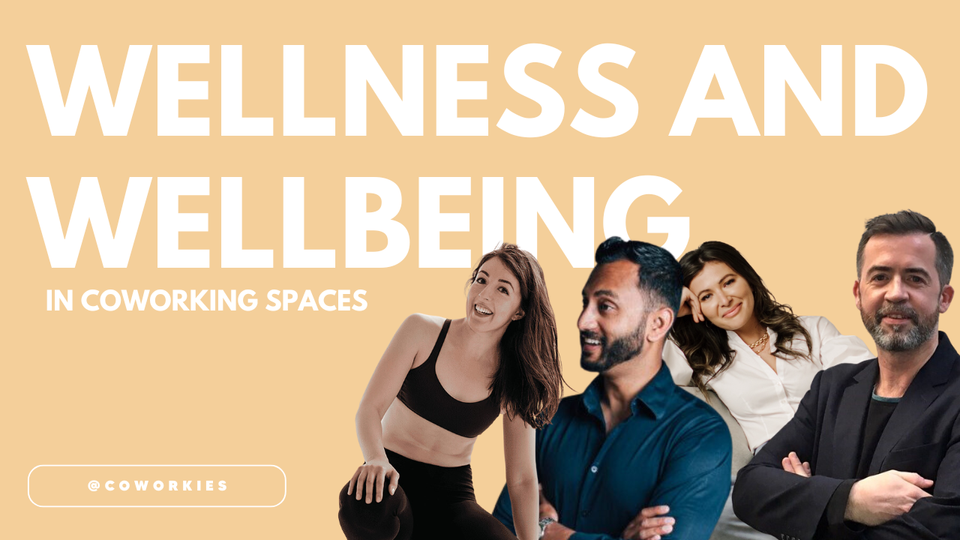
This case study provides a summary of key insights on wellness in coworking spaces, offering new perspectives on how these environments support physical, mental, and social well-being. Join us as we reflect on our findings and explore strategies to create healthier, more inclusive workspaces.
September is slowly fading away, and so is our exploration of our topic this month: wellness and well-being in coworking spaces.
Why this approach? If we want people to thrive at work, we must confront the factors that contribute to stress and disconnection within the workplace. A significant part of the issue lies in the absence of holistic wellness. From the lighting overhead to the chairs we sit in, from physical posture to mental well-being, every detail plays a role in creating an environment that fosters connection, focus, and comfort. To design a workspace that supports not just productivity but overall well-being, we need to consider how these elements come together to shape the human experience at work.
This challenge becomes even more significant in the context of coworking spaces, where the diversity of users means that wellness needs can vary widely. In these environments, the approach to well-being must be more than surface-level adjustments like offering yoga classes or ergonomic chairs—it requires a fundamental shift in how the space supports people physically, mentally, and socially.
Today’s case study combined everything we’ve learned so far from 2 incredible coworking brands pushing the topics of wellness and well-being forward in their regions of the world. But we go further—introducing two companies actively helping coworking spaces embed wellness into their core: The Office Yoga Company and Nook. These examples provide a deeper understanding of how spaces can truly support well-being at work.
Ready to begin your wellness journey?
🧘 Wellness and Well-Being in Coworking Spaces: What Have We Learned So Far?
🤓 Case Study: How To Build Healthier Coworking Environments? Wellness and Inclusive Design Tips
🌚 To Go Further: How Is The Topic of Wellness and Well-Being in Coworking Spaces Being Taken One Step Further?
🧘 Wellness and Well-Being in Coworking Spaces: What Have We Learned So Far?
Coworking Case Study 011 - How can a coworking space prioritize wellness as a core part of its offering?
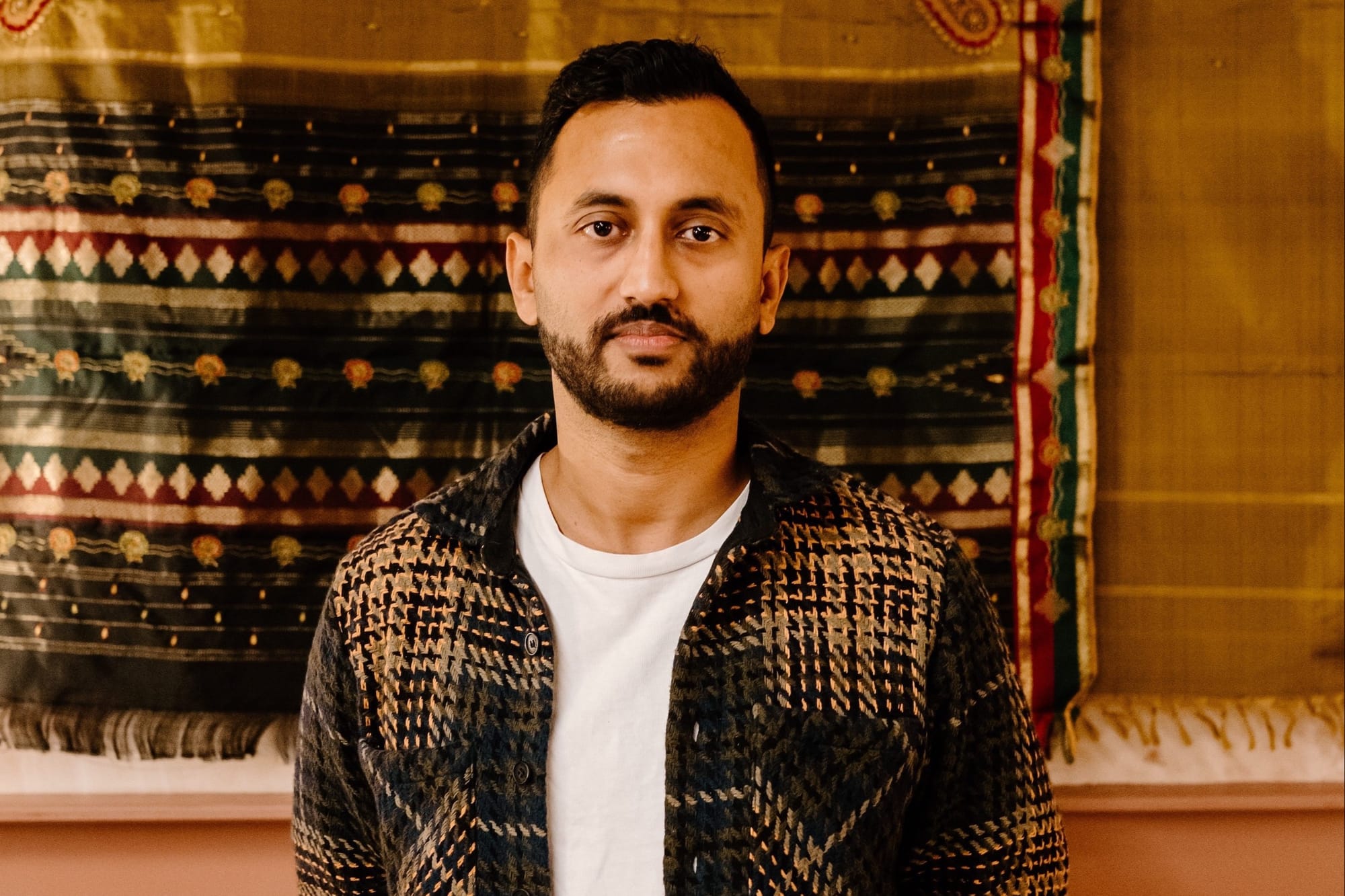
"Wellness doesn't have to mean yoga studios and lycra. It can be about mindfulness, quiet areas, or spaces for relaxation. Providing something that helps people be more present is crucial."
Vibushan Thirukumar, Co-Founder and CEO of Oru Space
Our first coworking case study on wellness and well-being highlighted Oru Space, a coworking space in South London that integrates wellness, hospitality, and community into its core mission. Founded by Vibushan Thirukumar and Paul Hepworth Nelmes, Oru Space launched just days before the pandemic in early 2020. Despite the challenges, the founders stayed committed to their vision of creating a purpose-driven space that fosters well-being and community.
Drawing on their personal experience with meditation and wellness practices, the founders made wellness a central part of Oru Space. They dedicated two rooms to wellness, offering up to 10 classes daily, including four free weekly sessions, making wellness accessible to everyone. This holistic approach, which also includes plant-based food offerings, has transformed Oru Space into a thriving hub where over 500 people gather daily.
Through this case study, we are reminded that wellness doesn’t have to be exclusive or complex. By providing simple, accessible opportunities for wellness and fostering an inclusive community, Oru Space has created a meaningful and successful co-working experience for its members.
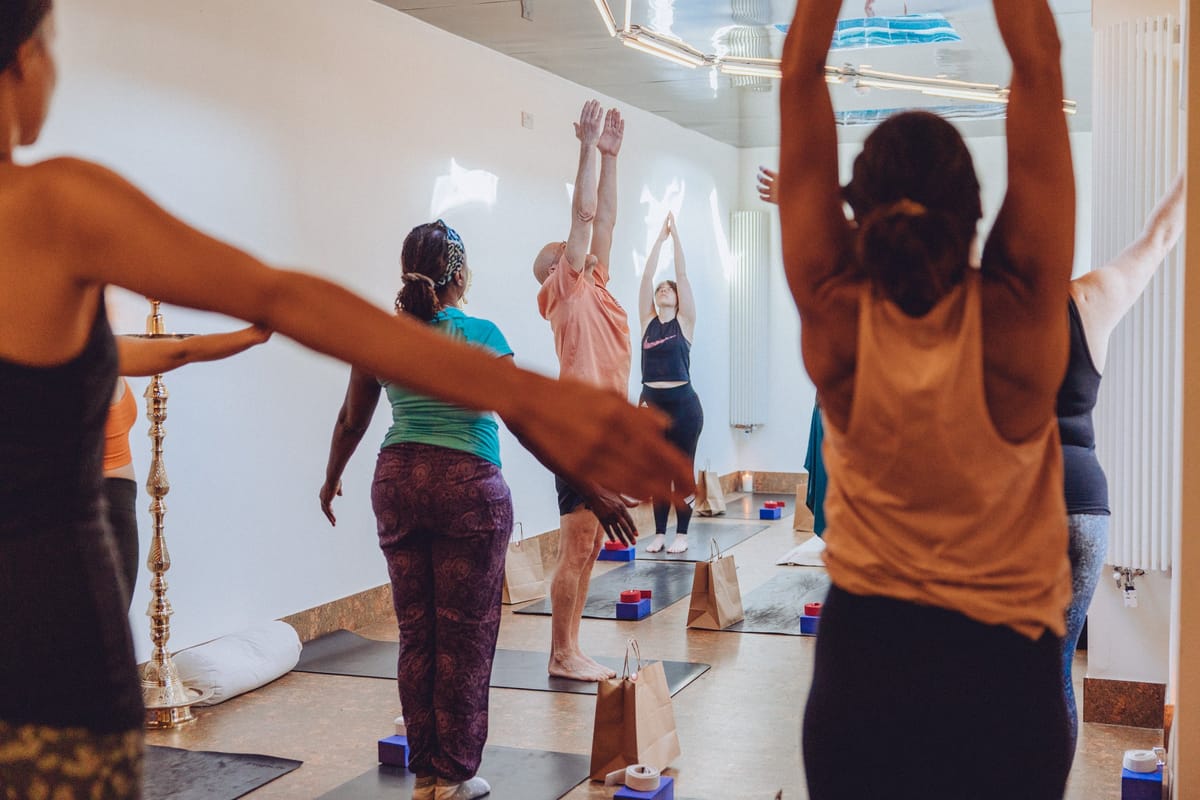
Coworking Case Study 012 - How can a coworking space foster genuine well-being and connection for its members?
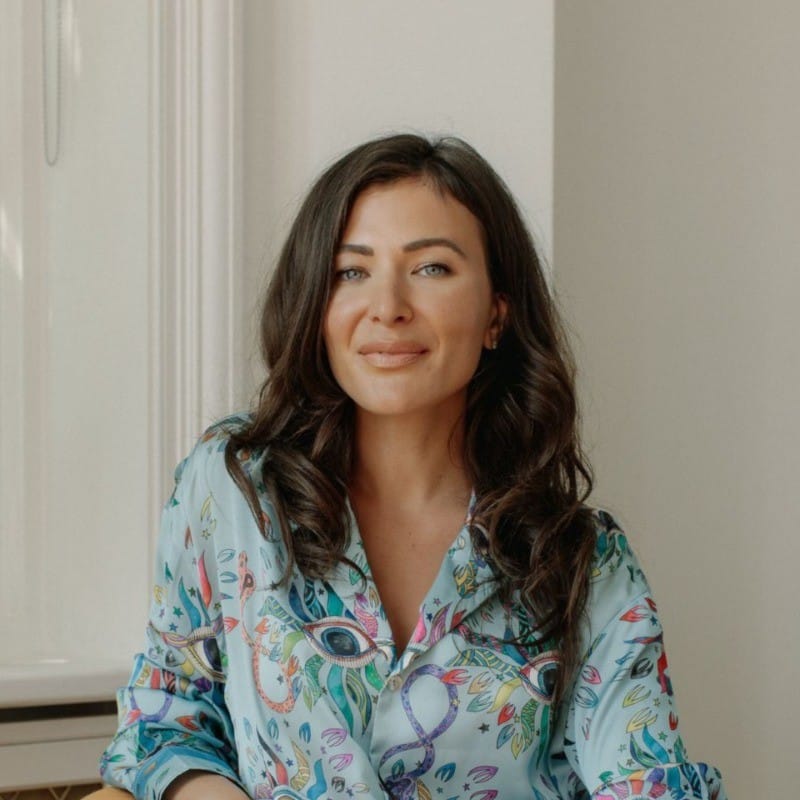
"It’s not just about having a nice space or offering a class—it’s about helping people reconnect with themselves and fostering intentional, meaningful connections in the community."
Christina Disler - Founder of Werklab
Our second coworking case study featured Werklab, a holistic well-being coworking space in Vancouver, which was founded by Christina Disler in 2016 with a clear mission: to elevate the human experience at work. Christina noticed the toxic culture of burnout that permeated workplaces, particularly in tech-driven environments, where sleepless nights and overwork were glorified. Her HR background led her to create Werklab as a counter to this, focusing on fostering authentic connections, creativity, and well-being.
Werklab integrates wellness into every aspect of its operations, from the intentional design of its space to the curated programming and workshops offered. While many coworking spaces provide yoga and meditation classes, Werklab goes deeper by building a sense of community where members are encouraged to reconnect with themselves and others. Christina emphasizes that wellness at Werklab isn’t just about physical activities like yoga or sound baths but about fostering moments of regeneration, connection, and personal development throughout the workday.
The space itself is designed to support well-being, featuring elements like carefully curated lighting, soft textures, and over 125 plants to create an environment that feels welcoming and nurturing. Werklab also hosts a variety of events, from financial wellness workshops to social gatherings, creating opportunities for members to grow both personally and professionally.
Christina’s biggest lesson in leading Werklab has been learning to apply mindfulness to her leadership, ensuring that the mission of well-being is not just externally offered to members but also internally practiced with her team. Werklab’s success shows that true wellness is about creating an inclusive, supportive environment where people feel they belong, can pause, and regenerate.
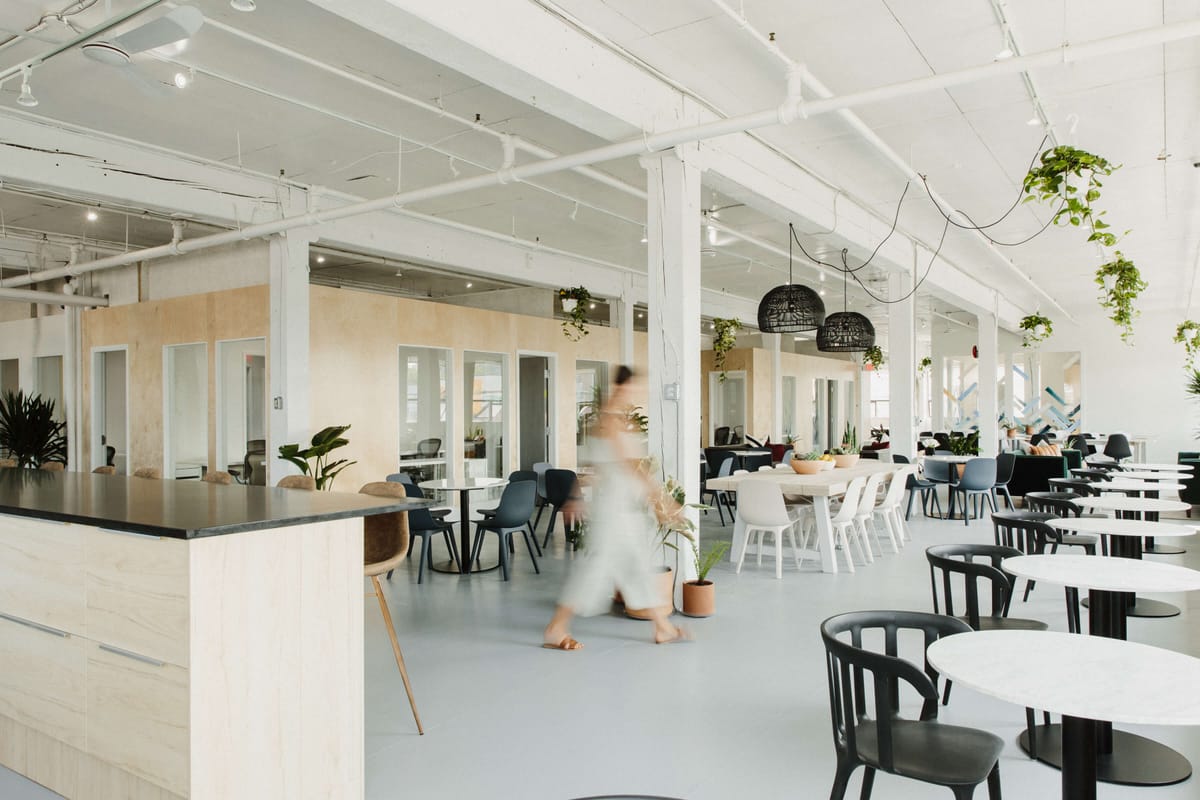
Case Study: How To Build Healthier Coworking Environments? Wellness and Inclusive Design Tips
After recapping our previous case studies on wellness in co-working spaces, it’s time to dive into real-world examples of products and services making a tangible impact.
This exploration takes us to London and Amsterdam, home to two companies we love: The Office Yoga Company and Nook Pods. What follows is a collection of actionable insights and best practices, offering coworking brands a clear set of tips to elevate their wellness and well-being offerings.
What’s The Office Yoga Company?
The Office Yoga Company specializes in bringing tailored wellness solutions to the workplace, focusing on improving the physical and mental well-being of office workers. They offer a range of services, including yoga, Pilates, mindfulness, breathwork, and posture-focused sessions, all designed to counter the negative effects of prolonged desk work. Their programs are adaptable to various work environments, including corporate offices and co-working spaces, helping employees reduce stress, improve posture, and enhance overall wellness, even during short breaks throughout the day.
What is Nook Pods?
Nook Pods creates modular, mobile pods designed to provide quiet, private spaces within companies or large-scale events. These pods offer a flexible solution for improving focus, reducing distractions, and promoting mental well-being by giving individuals a retreat from the noise and overstimulation of traditional workspaces. Nook Pods are also designed with inclusivity in mind, catering to neurodiverse individuals and those who benefit from a calm, controlled environment. Their customizable and movable design makes them ideal for collaboration, video calls, and personal recharging in dynamic work settings.
How To Build Healther Coworking Environments? Wellness and Inclusive Design Tips: A Coworking Case Study
The Why?
In today’s workspaces, especially coworking environments, the need for wellness and inclusivity has never been more apparent. Modern workers, whether freelancers, startups, or employees of larger organizations, spend long hours seated at desks, leading to physical strain and mental fatigue. Both Anouska Shenn, founder of The Office Yoga Company, and David O’Coimin, founder of Nook, recognized this challenge through their work.
Anouska emphasizes that workplace wellness is more than just a “nice to have”—it’s essential for maintaining both physical and mental health. She points out, “We really owe it to ourselves to give more than a passing thought to our habits and environments when we’re working because it has such a huge impact on how we feel not just in the office but the rest of the time as well.” Similarly, David critiques the traditional open-plan offices, saying, “I believe the particular drive towards almost exclusively open-plan workspace is toxic for a quiet majority of people who have different needs in an open space.”
The Implementation
Anouska and David approached the need for wellness and inclusivity in complementary ways.
The Office Yoga Company provides wellness programs that are customized for office and co-working environments, addressing issues like back pain and stress. These sessions focus on yoga, Pilates, mindfulness, and breathwork, designed specifically to counteract the physical strain caused by prolonged sitting. Anouska explains, "Weakness in these back muscles just creates more of the same, so it’s kind of a self-fulfilling prophecy of the more we sit like this, the harder it is to sit up straight." Her approach is to create regular, accessible wellness routines that workers can integrate into their day, even with short 10-minute sessions.
Nook, on the other hand, takes a more structural approach. David developed modular, movable pods that create quiet, private spaces in open-plan offices or coworking spaces. These pods provide a retreat from the overstimulating, noisy environment of traditional open spaces, offering what he calls “psychological safety.” He highlights, “We designed with extreme needs in mind—autism, ADHD, dyslexia, even highly sensitive people (HSP)—to create environments that cater to those needs, because designing for extremes benefits the mean.”
Both approaches allow to implement wellness and inclusivity in ways that suit their specific needs, whether it’s physical wellness programs or creating mindful spaces that offer privacy and comfort.
Integrating Wellness and Inclusive Design
By combining wellness initiatives and thoughtful workspace design, coworking spaces can provide environments that not only promote health but also enhance productivity and comfort for their members.
Anouska's wellness programs can be seamlessly integrated into a coworking environment by offering regular yoga or mindfulness classes, helping workers release stress and stay active during the day. Meanwhile, Nook pods can be used to create designated quiet zones or sensory-friendly areas, offering a refuge for those who need a break from the distractions of a busy workspace. David advocates for "simple changes to make a space more inclusive and mindful," encouraging operators to start small and involve their community in the process.
Tips on How To Implement Wellness Programs by Anouska Shenn, Founder of The Office Yoga Company
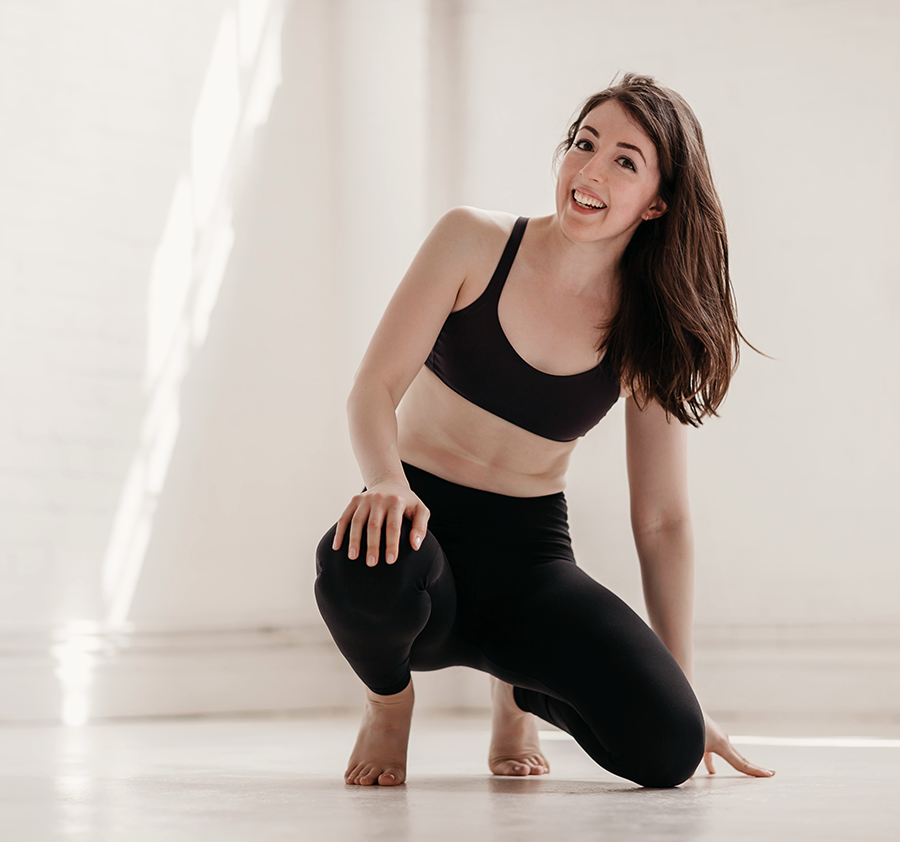
“We really owe it to ourselves to give more than a passing thought to our habits and our environments when we’re working because it has such a huge impact on how we feel not just in the office but the rest of the time as well.”
Anouska Shenn, Founder of The Office Yoga Company
In our conversation with Anouska Shenn, Founder of The Office Yoga Company, we talked about the importance of incorporating wellness and well-being initiatives into office and coworking environments.
She emphasized how creating accessible, tailored programs such as yoga, Pilates, and mindfulness counteracts the negative effects of prolonged sitting and stress. Her work and approach is focused on helping workers prioritize their health and wellness, making it easy to integrate short, effective sessions into the workday.
- Tailored Wellness Solutions: Wellness programs in offices should address specific issues faced by workers, like musculoskeletal pain and stress.
- Making Well-being Accessible: Short, regular sessions are more beneficial than occasional long ones, and creating a culture around well-being helps sustain it.
- Pandemic Impact: Companies now use wellness programs as a way to compete for talent, as employees increasingly expect their jobs to support their health and well-being.
- Practical Steps: Coworking operators should create dedicated wellness spaces, offer regular classes, and encourage employees to take initiative in their wellness journey.
Tips on Inclusive Design by David O’Coimin, Founder of Nook Pods

"We designed with extreme needs in mind—autism, ADHD, dyslexia, even highly sensitive people (HSP)—to create environments that cater to those needs, because designing for extremes benefits the mean."
David O'Coimin, Founder of Nook
David O'Coimin, Founder of Nook Pods, discussed how to create more inclusive and mindful work environments, particularly in coworking spaces. He emphasized how the traditional open-plan workspace is inadequate for many people and introduced Nook as a solution—modular pods that provide quiet, private spaces to recharge, focus, and engage in conversations without distractions. He highlighted the importance of personalization, sensory design, and psychological safety in creating a more effective and inclusive workspace.
- Inclusivity in Workspace Design: The open-plan office doesn’t suit everyone, and it’s important to create spaces that accommodate diverse needs, like Nook’s pods, which offer quiet, private zones.
- Psychological Safety and Personalization: Giving people control over their environment, such as adjustable lighting, makes them feel more comfortable and productive.
- Neurodivergent Design Principles: Designing with neurodivergent people in mind (those with ADHD, autism, or dyslexia) benefits everyone, as these solutions create spaces that are less stressful and more functional.
- Coworking’s Role in Future Workspaces: Coworking spaces are at the forefront of promoting wellness and inclusivity, and operators can play a key role by creating diverse, flexible environments that meet the needs of their members.
The growing emphasis on wellness and inclusivity in coworking spaces reflects a deeper understanding of the evolving needs of today’s workforce. As highlighted through the examples of Oru Space, Werklab, The Office Yoga Company, and Nook Pods, wellness initiatives that integrate physical, mental, and social well-being have the power to transform coworking environments.
By adopting wellness programs tailored to the unique demands of workers and incorporating thoughtful design elements that promote psychological safety and inclusivity, coworking operators can create spaces that go beyond just functionality. These environments actively support the well-being of their members, encouraging healthier, more balanced work lives. Whether it’s through regular yoga sessions or flexible workspace solutions like Nook Pods, the integration of wellness into everyday operations is no longer a luxury—it's a necessity for fostering an engaged and resilient workforce.
In a world where stress and disconnection often dominate the workplace, coworking spaces that invest in the well-being of their members and their teams will not only enhance productivity but will also cultivate a sense of community, purpose, and fulfillment. The examples shared in this article provide a roadmap for creating healthier, more inclusive workspaces, setting a new standard for coworking environments that truly prioritize the holistic well-being of their members.
To Go Further: How Is The Topic of Wellness and Well-Being in Coworking Spaces Being Taken One Step Further?
Do you want more inspiration on the topic of wellness and well-being in coworking spaces? We’ve got you! Over the last 2 years, there has been a surge of 2 interesting ‘coworking trends’ linked to wellness and well-being and that is: brands developing spaces specifically for wellness and healthcare professionals.
We’ve come across very interesting brands in different regions of the world, who are adapting the model of coworking to match the needs of wellness and health at work.
Keep scrolling down to discover them.
Amsterdam, The Netherlands
Stories Space offers flexible co-working spaces specifically designed for therapists and coaches. With locations in Amsterdam and Haarlem, members gain access to private, serene practice rooms, co-working areas, and a supportive community of like-minded professionals. The company also provides wellness events, professional services, and flexible memberships to help practitioners grow their businesses. Stories Space emphasizes creating environments that foster well-being and connection for therapists, coaches, and their clients.

Paris, France
Instacare creates specialized "MedWorking" spaces for dental professionals, offering fully equipped, modern facilities in key French cities like Paris, Lyon, Marseille, and Strasbourg. These spaces are designed to provide comfort for both practitioners and patients, featuring custom interiors and advanced dental technologies such as prosthetic labs and radiography. Instacare's concept supports flexible practice schedules, enabling dental professionals to work without the overhead of maintaining their own practice, while fostering collaboration within a community of specialists.
Germany
Eterno Health offers modern, holistic healthcare spaces designed to enhance the patient experience. Located in cities like Hamburg and Frankfurt, Eterno's facilities blend advanced medical care with wellness features, including yoga areas, fitness spaces, and serene environments based on "Healing Architecture." They cater to a variety of medical specialties while providing patients with comfortable, welcoming spaces. Eterno supports practitioners with fully equipped rooms and administrative services, fostering a better, more human-focused healthcare experience.

USA
Lina offers flexible, fully serviced medical coworking spaces in New York and Florida, designed for independent healthcare providers. Their spaces are HIPAA and OSHA compliant, providing private offices and on-demand medical, therapy, and bodywork rooms. Lina supports practitioners by handling operational logistics, allowing them to focus on patient care. With a community-driven approach, Lina fosters collaboration through networking events and professional opportunities, creating a supportive environment for healthcare professionals.






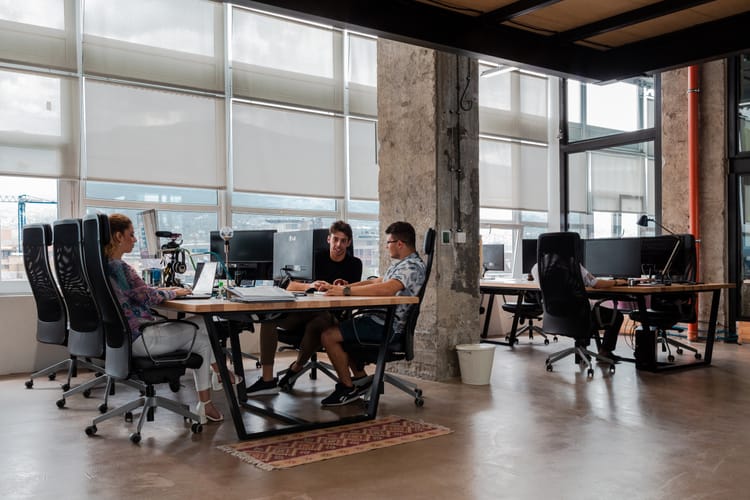
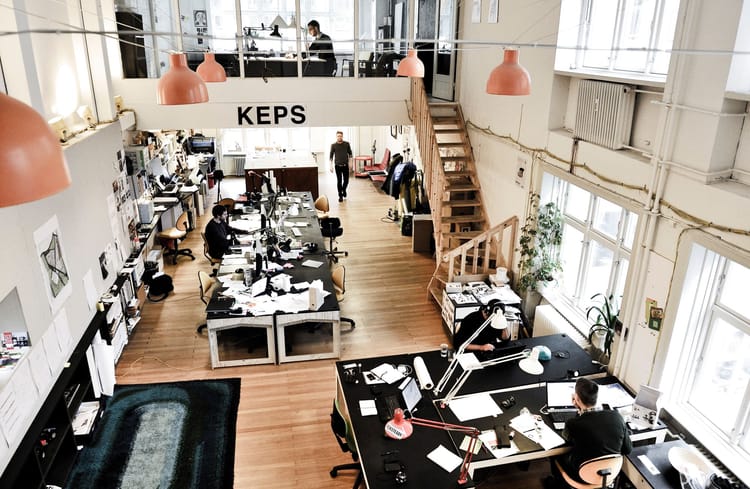
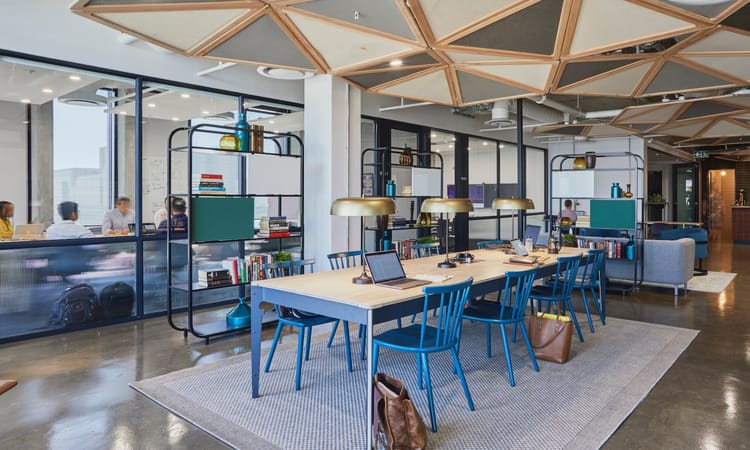
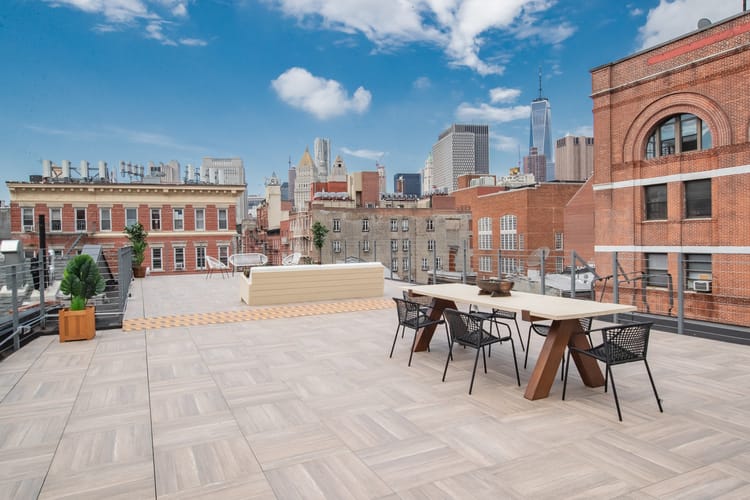
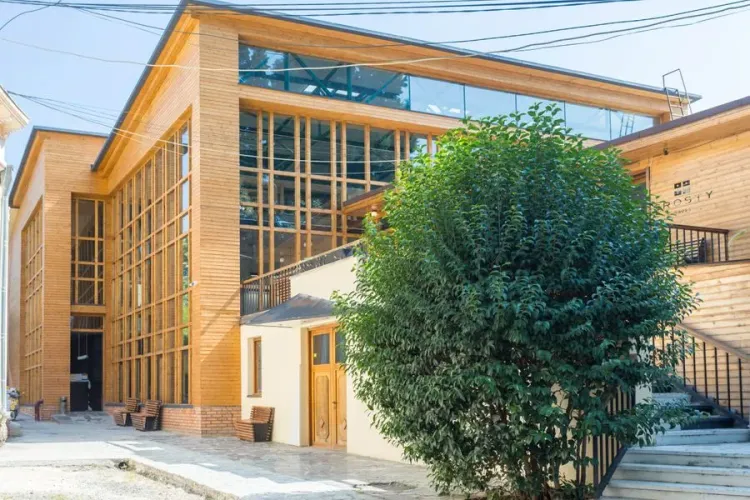
Member discussion